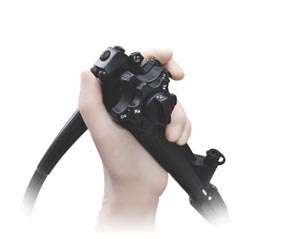About Us
Find your care
Our expert interventional endoscopy team includes skilled physicians who perform minimally invasive endoscopic procedures to treat GI disorders. Call 310-825-2631 to connect with a specialist.
Interventional endoscopy is a subspecialty of gastroenterology involving advanced procedures in the gastrointestinal (GI) tract. Using a thin, flexible tube equipped with a miniature camera and light — a scope — interventional endoscopists are able to diagnose and treat a growing number of GI conditions that were once out of reach except perhaps to surgeons. The advantages of endoscopic techniques include low rates of complications, faster recovery times, and the ability to combine and tailor diagnostic and therapeutic procedures to patients’ needs. In almost all cases, interventional endoscopy procedures are done on an outpatient basis.

In its infancy, endoscopy’s role was to “look and sample” — to collect pictures and, if indicated by what was seen, take a biopsy; the treatment, in most cases, was left to surgeons. That began to change with the first endoscopic therapies to manage GI bleeding and to remove stones from the bile duct. The development of endoscopic ultrasound accelerated the use of endoscopy as a therapeutic tool, and the field has grown dramatically in recent years as indications for what can be done endoscopically continue to expand.
Interventional endoscopy is now performed to remove blockages throughout the GI tract, as well as to diagnose and in many cases remove GI tumors. Acid reflux, pancreatitis and weight-loss procedures are just a few of the many treatments for which interventional endoscopy is increasingly viewed as an effective, less invasive option than surgery. Interventional endoscopists remove large polyps from the colon, perform bariatric endoscopies for people who are obese, address a wide variety of liver disorders, treat esophageal motility disorders such as achalasia (a swallowing disorder) through a procedure known as POEM, and treat Barrett’s esophagus patients to prevent the development of cancer or remove early cancers, among others.
The interventional endoscopists work in close collaboration with surgeons, medical oncologists, radiologists, pathologists, and others. This multidisciplinary approach ensures that patients benefit from the breadth and depth of expertise throughout the UCLA Health system, along with the convenience of seeing specialists who work under the same roof. Integrated clinics for patients with pancreatic and esophageal disorders, for example, include not only physicians from all relevant specialties, but also social workers and scientists, all of whom meet regularly to discuss each patient’s case and arrive at a consensus on the best course of treatment.
In 2011, the UCLA interventional endoscopy program consisted of a single physician performing advanced endoscopy procedures. Today the program boasts five interventional endoscopists, along with advanced fellows, research analysts, and contributions from numerous GI fellows, residents, and medical students. This growth has allowed the program to offer a wider range of services, and to expand geographically to meet the needs of patients in communities well beyond UCLA’s Westwood and Santa Monica facilities — including the San Fernando and Santa Clarita valleys, with further expansions ahead. As our team continues to lead the way in expanding and improving on the diagnostic and therapeutic capabilities procedures that can be performed, interventional endoscopy will play an increasingly prominent role at UCLA.